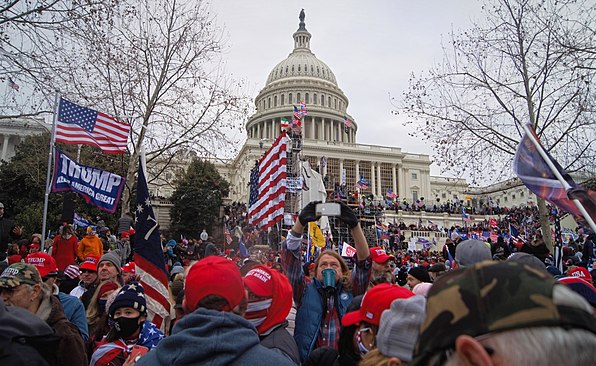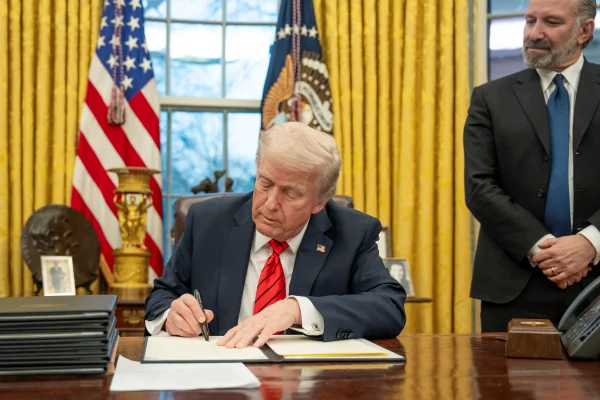Trump Subpoena Next Step in Jan. 6 Investigation

The future of the Jan. 6 Committee’s investigations into Donald Trump hang in the balance after the committee subpoenaed the former president, raising the possibility of him having to testify under oath.
The Jan. 6 Committee has paved the way for a historic legal battle after the congressional committee ordered that the Donald Trump testify under oath, an order that has only been issued for former presidents a handful of times. While Trump’s attorneys have signaled that their client may comply with the order, some suspect convincing him to testify as part of the Committee’s investigations will not happen without major negotiation.
The subpoena issued by the Jan 6 Committee is the most aggressive legal action taken by the committee since its formation back in July 2021, when it began investigating the events leading up to the Jan. 6 attack on the Capitol and Trump’s role in inspiring the attack. The committee, which is responsible for one of the most significant congressional investigations in decades, is relying on testimony from Trump and other key witnesses to continue its investigation, which could possibly result in a recommendation for criminal charges against the former president.
In a long letter that went along with the subpoena order for the former president, members of the committee outlined their reasons for issuing the subpoena, which included important questions they have about his interactions with militia leaders and his attempts to create slates of false electors leading up to the 2020 election.
“As demonstrated in our hearings, we have assembled overwhelming evidence, including from dozens of your former appointees and staff, that you personally orchestrated … a multipart effort to overturn the 2020 presidential election and to obstruct the peaceful transition of power,” Representative Bennie Thompson, Democrat of Mississippi, and Representative Liz Cheney, Republican of Wyoming, the leaders of the committee, wrote in the letter.
In the letter, members of the committee also noted the significance of subpoenaing a former president, an action they say they take very seriously.
“We recognize that a subpoena to a former President is a significant and historic action, [and] we do not take this action lightly,” the letter said.
In addition, the committee responded to some legal experts who question whether or not a former president can legally be ordered to testify by Congress.
“[Trump] would not be the first former president to testify before Congress or to receive a congressional subpoena,” the Committee explained. “Former Presidents John Quincy Adams, John Tyler, Theodore Roosevelt, William Howard Taft, Herbert Hoover, Harry Truman, and Gerald Ford each testified before Congress after they left office.”
Although it is not unheard of for a former president to testify in front of Congress, many legal experts doubt Trump will comply with the order, and predict that he will instead continue to resist it through legal action, as he has done in the past.
“It is understandable that [the Jan. 6 Committee] would make that move, and it underscores their point that [Trump] was the driver behind the violence and aware of all the efforts to overturn the election,” said Lisa Kern Griffin, a professor of Law at Duke University. “But subpoenaing him is a gesture. It will not result in any testimony from the former president.”
Questions have also been raised about the format of the possible testimony from the former president, an issue committee members have touched on.
“It’ll be done under oath [and] potentially over multiple days,” rep. Cheney explained when asked about the format of the testimony. The Congresswoman also reiterated that the Committee will not be at the “mercy of Donald Trump” at any point throughout the process.
The Willistonian spoke with Austin Sarat, a political scientist and Professor of Law at Amherst College. Sarat believes that the issue of Trump being prosecuted should not be made political.
“The question of whether Trump should be prosecuted has to be kept out of the political process,” Sarat explained. “If the Jan. 6 Committee recommends a criminal prosecution it might be seen as partisan or political, so I think it’s probably best that it be left to professionals in the Department of Justice.”
While there are grounds on which the former president could be prosecuted, Sarat says, charging him with crimes might not be the smartest move.
“Trump being prosecuted could be damaging in some ways to the political fabric of the United States,” Sarat told The Willistonian. “The prosecution could turn him into a martyr, and it might just feed into his whole narrative of victimization.”
In wake of the recent attack on the home of House Speaker Nancy Pelosi, some have voiced concerns about how the former president’s base would respond to him being prosecuted. Sarat believes that there would be some backlash if the Trump were to be prosecuted, but says that it is hard to predict how what form the backlash would take.
“If he were to be prosecuted there would be a substantial backlash in some segments of the population, but what form that backlash would take, and how it would play out, it’s hard to speculate,” he said.
Since the attack on the Capitol, many have voiced calls to put laws in place to prevent a president from attempting to subvert an election, but Sarat believes it is up to the American people to elect leaders who will respect the rule of law.
“Ultimately, the most important check on the abuse of presidential power is in the choice of who is elected president,” Sarat explained. “And I think that’s the question: whether or not the American people will insist that public officials respect the democratic process and the rule of law. So, if you want to ensure that a president doesn’t abuse power, be careful who you choose as president,” he said.
Olin Rose-Bardawil is a senior from Northampton, MA who has written for the Willistonian since 2021 and has served as its editor-in-chief since 2023. In...










